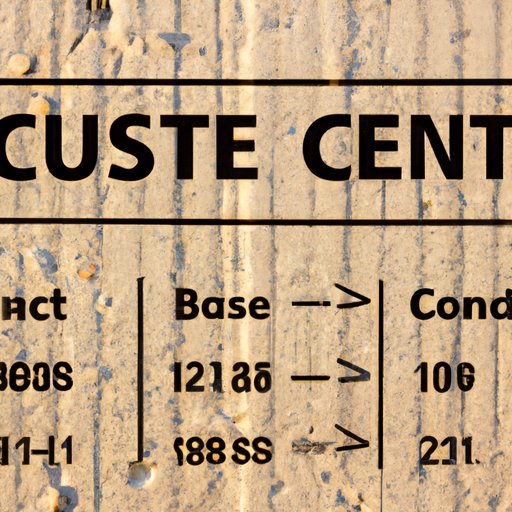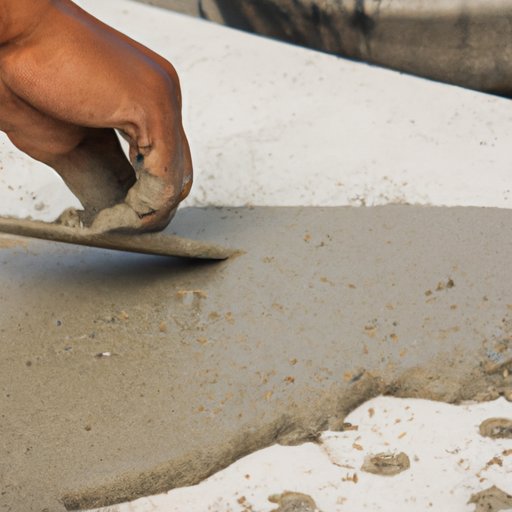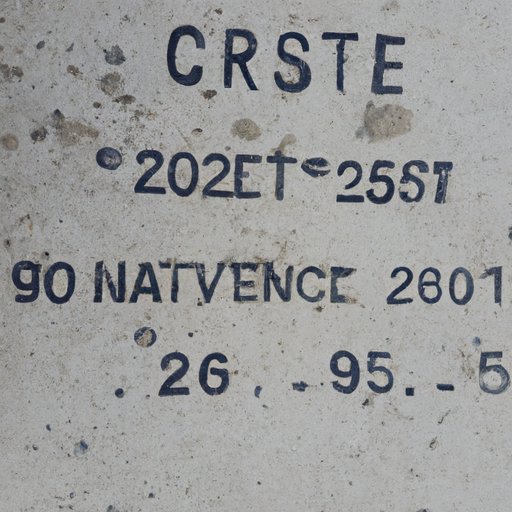Introduction
Concrete is a widely used building material throughout the world. It is strong, durable, and versatile, making it an ideal choice for many construction projects. Knowing the cost of concrete per square foot is essential to budgeting for a construction or home improvement project. In this article, we’ll explore the cost of concrete per square foot, what factors impact the cost, and strategies for getting the best price on concrete.
A Breakdown of Concrete Cost per Square Foot
The average cost of concrete per square foot is between $3 and $10. This cost varies based on several factors, including the type of concrete used, the location of the project, and the size and complexity of the project. It’s important to understand these factors when calculating the cost of a concrete project.

How to Calculate the Cost of a Concrete Project
When estimating the cost of a concrete project, there are three main components to consider: the amount of concrete needed, the cost of labor and materials, and the delivery cost. Here’s a step-by-step guide to calculating the cost of a concrete project:
- Estimate the amount of concrete needed. Start by measuring the area where the concrete will be poured. Then, use a concrete calculator to determine the amount of concrete needed. Keep in mind that you may need to add extra material to account for settling.
- Determine the cost of labor and materials. Once you know the amount of concrete needed, contact local suppliers to get quotes for the labor and materials needed. Be sure to ask about any discounts or special offers that may be available.
- Calculate the total cost of the project. Add up the cost of the labor, materials, and delivery to get the total cost of the project.
Exploring Factors That Impact Concrete Cost
There are several factors that can influence the cost of a concrete project. These include:
- Type of Concrete Used: The type of concrete used in a project can have a significant impact on the cost. For example, standard concrete typically costs less than high-performance concrete.
- Location of the Project: The location of the project can also affect the cost of concrete. For example, projects located in urban areas typically cost more than those located in rural areas.
- Size and Complexity of the Project: The size and complexity of a project can also influence the cost of concrete. Projects that require more intricate designs or larger quantities of concrete will cost more than simpler projects.
- Time of Year When the Project is Being Completed: The time of year when a project is being completed can also affect the cost of concrete. For example, projects completed during the winter months may cost more due to colder temperatures.

A Guide to Estimating Concrete Costs
To get an accurate estimate of the cost of a concrete project, it’s important to consider the cost of labor and materials. Here’s a guide to estimating the cost of concrete:
- Estimating the Cost of Labor: When estimating the cost of labor, consider the number of workers needed, the amount of time needed for the project, and the rate of pay for each worker.
- Estimating the Cost of Materials: When estimating the cost of materials, consider the cost of the concrete itself, as well as any additives, sealants, or finishes needed.
- Estimating the Cost of Delivery: If the project requires the delivery of concrete, be sure to include the cost of delivery in your estimate.
Comparing Concrete Prices Across Different Areas
When shopping for concrete, it’s important to compare prices across different areas. Here are some tips for finding the best price on concrete:
- Shopping Around for the Best Price: Compare prices from multiple suppliers to get the best price on concrete.
- Checking Online Resources: Check online resources such as Craigslist and eBay to find competitive prices on concrete.
- Contacting Local Suppliers: Contact local suppliers to inquire about their prices and any discounts they may offer.

What to Consider Before Purchasing Concrete
In addition to price, there are other factors to consider when selecting concrete for a project. These include:
- Quality of the Concrete: Be sure to select a high-quality concrete that meets the requirements of your project.
- Delivery Times: Make sure the supplier can provide the concrete when you need it.
- Payment Terms: Ask about payment terms and any discounts available for paying upfront.

How to Get the Best Price on Concrete
Getting the best price on concrete involves doing your research and negotiating with suppliers. Here are some tips for getting the best price on concrete:
- Request Multiple Bids: Request bids from multiple suppliers to ensure you get the best price.
- Negotiate: Negotiate with suppliers to get the best possible price.
- Ask for Discounts: Ask about any discounts or special offers that may be available.
Conclusion
Knowing the cost of concrete per square foot is essential for budgeting for a construction or home improvement project. There are several factors that can impact the cost of concrete, including the type of concrete used, the location of the project, and the size and complexity of the project. To get the best price on concrete, it’s important to do your research, request multiple bids, negotiate, and ask for discounts. With the right approach, you can get the best price on concrete for your project.
(Note: Is this article not meeting your expectations? Do you have knowledge or insights to share? Unlock new opportunities and expand your reach by joining our authors team. Click Registration to join us and share your expertise with our readers.)
